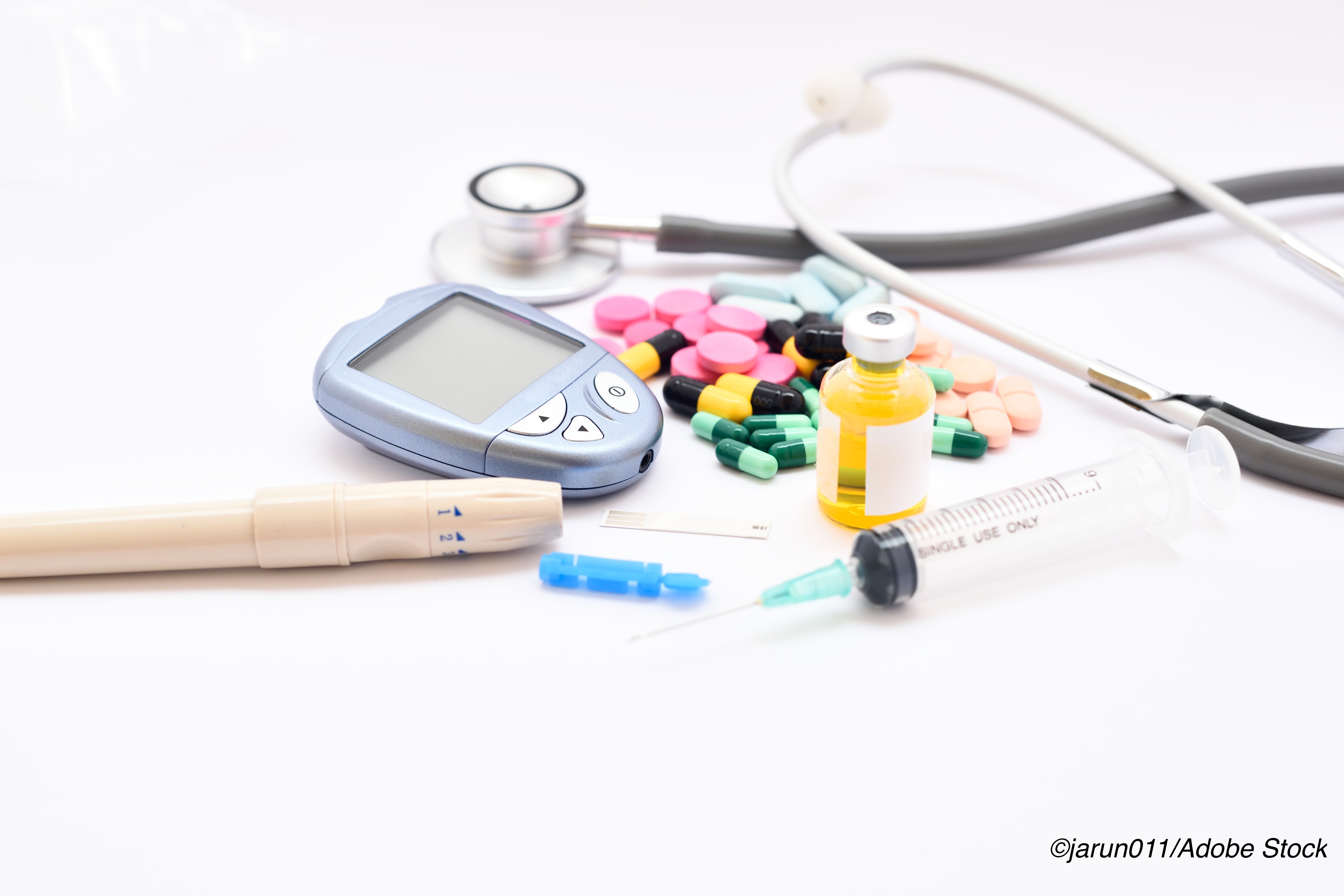
Patients with type 2 diabetes who get Covid-19 should stay on their diabetes medications, although different agents were tied to different risks for Covid-19-related mortality, U.K. researchers reported.
Patients taking metformin had a statistically lower risk for Covid-19-related death, as did those taking sulfonylureas and SGLT2 inhibitors. But the same was not true for patients prescribed insulin or DPP-4 inhibitors, stated Kamlesh Khunti, MD, PhD, of the Diabetes Research Centre at the University of Leicester in England, and co-authors.
In a national cohort of 2.85 million people with type 2 diabetes, 0.5% Covid-19-related deaths occurred during the study period from February through August 2020, which corresponded to a rate of 8.9 per 1,000 person-years (95% CI 8.7 to 9.0), they wrote in the Lancet Diabetes & Endocrinology.
The adjusted hazard ratios linked with recorded versus no recorded prescription were:
- Metformin: HR 0.77 (95% CI 0.73-0.81).
- SGLT2 inhibitors: HR 0.82 (95% CI 0.74-0.91).
- Insulin: HR 1.42 (95% CI 1.35-1.49).
- DPP-4 inhibitors: HR 1.07 (95% CI 1.01-1.13).
- Meglitinides: HR 0.75 (95% CI 0.48-1.17).
- Thiazolidinediones: HR 0.94 (95% CI 0.82-1.07).
- Sulfonylureas: HR 0.94 (95% CI 0.89-0.99).
- GLP-1 receptor agonists: HR 0.94 (95% CI 0.83-1.07).
- α-glucosidase inhibitors: HR 1.26 (95% CI 0.76-2.09).
However, the authors cautioned that the “lower and higher risks associated with these drugs are likely to be due to residual confounding rather than direct drug effects… [w]e interpret these findings to suggest that there is, as yet, no clear indication to jeopardize a modifiable risk factor—glucose control—or other potential glucose-independent benefits of specific drugs by stopping or changing diabetes medications in people with type 2 diabetes in daily practice.”
The findings are in step with those from the French CORONADO trial, which showed that in-hospital patients with Covid-19 and diabetes who used metformin had a decreased mortality risk, while those on insulin did not, and a Danish study demonstrating that incretin-based therapies were not tied to better outcomes for the same patient population, but were not in line with those from a South Korean-German study that stated DPP-4 inhibitors were okay across a broad spectrum of Covid-19 severity, noted Guntram Schernthaner, MD, of Rudolfstiftung Hospital Vienna at the Medical University of Vienna, in a comment accompanying the study.
What is the practical application for these data? Schernthaner suggested that “recommendations on the use of glucose-lowering drugs by people with type 2 diabetes during the Covid-19 pandemic might now become more liberal, allowing use of all glucose-lowering drugs in stable situations… strict management of cardiovascular risk factors and tight glycemic control are crucial for patients with diabetes and Covid-19.”
As for the Covid-19 vaccine, Schernthaner called for patients with type 2 diabetes to be prioritized. According to the American Diabetes Association, all people in the U.S. with diabetes (types 1 and 2) were moved up in the vaccination queue per the CDC in March 2021.
Khunti and co-authors explained that hyperglycemia is an independent risk factor for Covid-19-related mortality in patients with type 2 diabetes, and accounts for up to a third of all deaths in some countries, so they wanted to evaluate if “there are associations between prescription of different classes of glucose-lowering drugs,” and such risks in these patients.
Schernthaner offered some potential reasons for the Covid-19-related death risk in type 2 diabetes, such as metabolic inflammation, enhanced release of cytokines, chronic inflammation, and hypercoagulable state.
The nationwide observational cohort study by Khunti’s group was done with data from the National Diabetes Audit (NDA) for people with type 2 diabetes. Almost 56% of the entire cohort for the study was male and about 20% were ages ≥80, while 66% were white. Almost 28% had a diabetes duration of 5 to 9 years, while 35% were former smokers, and a little over 31% had a BMI from 25 to <30 kg/m2. Finally, over three-fourths were taking antihypertensive drugs while almost 75% were on statins.
Study limitations included the fact that some of the diabetes agents had been suspended before or on admission to hospital for Covid-19 in late 2019. Also, there was no data on medication dose and adherence. And, “during the pandemic, the reporting of Covid-19 as either the underlying cause of death or a significant contributory factor might have been inconsistent,” the authors noted.
Finally, “we cannot infer causality from our observations,” Khunti and co-authors stated, so more specific answers should come from ongoing research, such as the DARE-19 study, the MET-Covid trial, the SIDIACO trial, and two studies with DPP-4 inhibitors out of Israel and the U.S.
-
Patients with type 2 diabetes on metformin had a statistically lower risk for Covid-19-related death, as did those taking sulfonylureas and SGLT2 inhibitors, but the same was not true for patients prescribed insulin or DPP-4 inhibitors.
-
There is no clear indication to change prescribing of glucose-lowering drugs in people with type 2 diabetes who also developed Covid-19, according to an observational study of a U.K. database.
Shalmali Pal, Contributing Writer, BreakingMED™
Khunti reported relationships with, and/or support from, the NDA, Novo Nordisk, Sanofi-Aventis, Lilly, and Merck Sharp & Dohme (MSD), Novartis, Pfizer, Boehringer Ingelheim.
Co-authors reported relationships with, and/or support from, the NDA, Napp Pharmaceuticals, Boehringer Ingelheim, NHS England, NHS Improvement Diabetes Prevention Programme, Diabetes UK, Amgen, AstraZeneca, Eli Lilly, MSD, Novartis, Novo Nordisk, Pfizer, and Sanofi.
Schernthaner reported relationships with Boehringer Ingelheim, Eli Lilly, Mundipharma, AstraZeneca, and Takeda.
Cat ID: 12
Topic ID: 76,12,730,933,12,13,187,190,926,192,669,927,918,925,934



Create Post
Twitter/X Preview
Logout